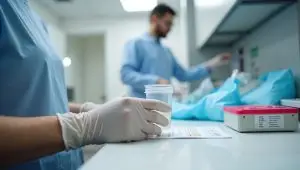When applying for a job, a pre-employment drug test may be part of the process. It's nerve-wracking to think that failing this test could influence your career prospects or even go on your permanent record. In this guide, we'll explore what happens when you fail a pre-employment drug test, the potential consequences, and whether or not this failure can haunt your future endeavors.
Key Takeaways
- Pre-employment drug tests are designed to ensure safety and productivity in the workplace, causing job offer retractions if failed.
- The types of drug tests include urine, blood, saliva, and hair follicle tests, each with their own detection windows and costs.
- A failed pre-employment drug test generally does not go on your permanent employment record but can impact immediate job prospects.
- Knowing your legal rights and protections, such as the ability to appeal false positives, is crucial in navigating the aftermath of a failed test.
- Taking proactive steps like rehabilitation, skill-building, and honest future disclosures can significantly improve your employment chances post-failure.
Introduction
Imagine this: You've nailed the interview, and the job is practically yours, pending one last hurdle—a pre-employment drug test. Suddenly, the anxiety kicks in. What if something goes wrong? What if a failed test ruins everything?
Pre-employment drug tests are a common step in many hiring processes. They serve as a tool for employers to ensure workplace safety and productivity. However, the thought of failing one can be daunting, bringing up questions about your future job prospects and whether this failure could mar your permanent record.
In this article, we'll delve into the nitty-gritty of what really happens if you fail a pre-employment drug test. We'll cover the immediate fallout, long-term implications, and crucially, whether such a failure can linger on your record and haunt you as you move forward in your career. Buckle up, because understanding this terrain means you're one step closer to navigating it successfully.
EXPERT INSIGHT: As one who has walked candidates through their best and worst moments in the hiring process, I've seen how devastating a failed drug test can be—particularly having worked so hard to reach that point. But I've seen turnarounds, too. Individuals make mistakes, individuals recover, and individuals grow. As HR professionals, we're not just gatekeepers—we're builders of people. A failed test needn't be the end of the world, but the moment to restart, re-energize, and re-engage in the workforce with determination. - Charm Paz, CHRP
Understanding Pre-Employment Drug Tests
Definition and Purpose
Pre-employment drug tests are screenings that potential employers use to check for the presence of illegal drugs or prescription medications in a candidate's system. The primary purpose is to ensure a safe, productive workplace and to verify that employees abide by the company's drug-free policies.
Types of Tests
Several types of drug tests are commonly used in pre-employment screenings:
- Urine Tests: The most common, often used because it's non-invasive and cost-effective.
- Blood Tests: Less common due to being invasive and costly, but highly accurate.
- Saliva Tests: Becoming more popular due to their non-invasive nature and quick results.
- Hair Follicle Tests: Can detect drug use over a more extended period, but are more expensive.
Substances Tested
Employers usually test for a range of substances, including:
- Marijuana
- Cocaine
- Opiates (e.g., heroin, morphine)
- Amphetamines and Methamphetamines
- Phencyclidine (PCP)
- Barbiturates
- Benzodiazepines
Legal Framework
The legality of pre-employment drug testing varies by location and industry. Federally, certain sectors like transportation and defense mandate such tests. State laws can differ, with some states requiring employers to provide clear notice about drug testing policies. Understanding your legal rights can be crucial in navigating the process.
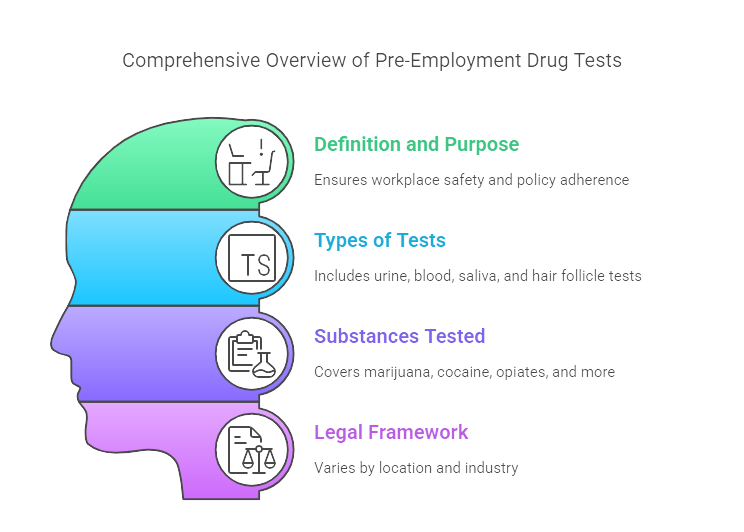
Immediate Consequences of Failing a Pre-Employment Drug Test
Failing a pre-employment drug test can generate a lot of anxiety, and for good reason. While each company has its own policies, the immediate consequences can generally be categorized in a few key areas.
Employer Policies
Every company has its own way of handling drug test failures, and these policies can vary widely. Some might have a zero-tolerance stance and rescind offers immediately. Others might be more lenient, especially if the company has a strong commitment to second-chance employment or rehabilitation programs. Understanding your potential employer's policy can usually be gleaned from their employee handbook or by asking the HR department directly.
Offer Withdrawal
The most common immediate consequence is the withdrawal of a job offer. If you fail a pre-employment drug test, most employers will simply move on to the next candidate. It's not personal; it's business. Hiring decisions often need to be swift and without complications, and a failed drug test is generally seen as a red flag that deters employers from proceeding.
Impact on Immediate Job Search
Finding out that you’ve failed a drug test is bad enough, but the ripple effects can also be significant. For one, it may impact your confidence and stress levels, which can compromise future interviews or job applications. Moreover, if you’ve been actively seeking jobs and have multiple applications out, you might find yourself needing to reassess your approach. Some industries and companies may share information about drug test failures, especially if you’re applying within a niche sector. It’s crucial to correct course immediately—addressing any substance issues if applicable and being upfront in future applications if required.
Navigating through the immediate aftermath of a failed drug test can be tricky, but understanding these basic repercussions can better prepare you for what comes next.
Does a Failed Pre-Employment Drug Test Go on Your Record?
Employment Record
So, you've failed a pre-employment drug test. You’re probably wondering if this blunder will be etched into your employment record forever, haunting every future job application. Here’s the deal: generally, a failed pre-employment drug test does not become part of your formal employment record. Companies keep this information internal and don't typically disclose it to other potential employers. However, if you’re already employed and fail a random or scheduled drug test, the results could end up in your personnel file, especially if company policy dictates it.
Background Checks
One of the top concerns is whether a failed drug test pops up during background checks. The short answer? Usually, it doesn’t. Background checks for employment focus more on criminal history, employment verification, and sometimes credit checks, not on your previous failed drug tests. According to the Federal Trade Commission (FTC), certain background check details are regulated and pre-employment drug tests aren’t typically among those details. But be aware, if your previous employer reported the incident and it involves criminal charges, then it might show up.
Test Providers and Reporting
The role of third-party test providers is also crucial to understand. These external agencies conduct the tests and report back to the hiring company. They don’t have the authority to add this information to a public record or a common database accessible by other employers. They report directly to the company that ordered the test. Keep in mind, regulations like the Fair Credit Reporting Act (FCRA) require companies to inform you if they plan to take adverse action based on your drug test results. Always read the fine print on consent forms to know how your data might be used.
So, in sum, while failing a pre-employment drug test can temporarily set you back, it's not the scarlet letter some fear it to be. Understanding these mechanisms can help you strategize for the future.
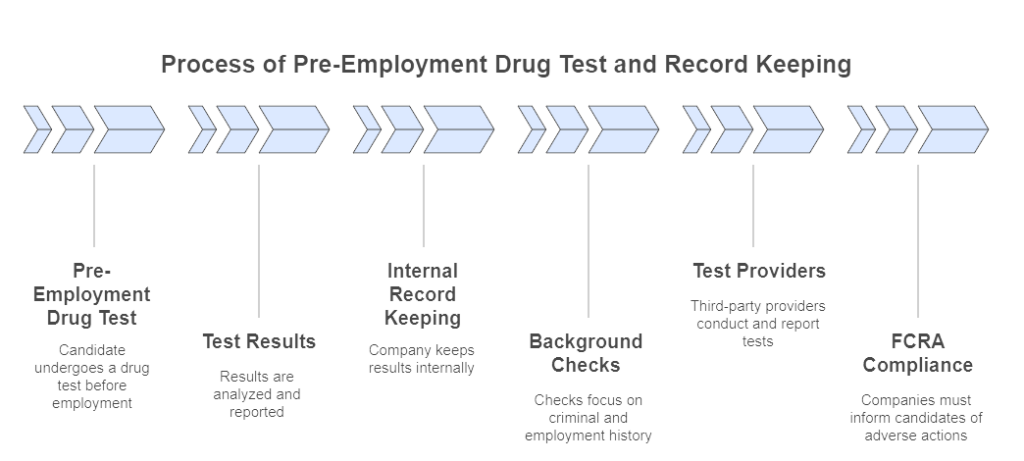
Legal Rights and Protections
When it comes to employment, knowing your legal rights is crucial, especially in circumstances involving drug testing. These rights can differ based on federal and state jurisdictions, but there are common protections you should be aware of.
Employee Rights
First, you have the right to be informed about the drug test beforehand. Employers are generally required to tell you that drug testing is part of their hiring process. Additionally, they should reveal what substances they are testing for and which type of test will be conducted.
You also have the right to confidentiality. The results of your drug test must be kept private and only shared with individuals who need to know within the company. If the information is mishandled, you might have legal grounds for a complaint.
Discrimination and Fair Chance Laws
Many jurisdictions have laws designed to protect you from discrimination if you fail a drug test. Under these laws, known as Fair Chance Laws, employers may be limited in how they can use your documented drug test results. For instance, some states prohibit automatic disqualification based on a failed drug test, requiring employers to consider other factors before making a final decision.
In addition, the Americans with Disabilities Act (ADA) offers protections if you are using prescribed medications that may result in a positive test. If this is the case, you may need to provide documentation from your healthcare provider.
Appealing a False Positive
The nightmare scenario: a false positive. Though rare, it happens. Fortunately, you have the right to dispute and appeal these results.
First, request a confirmation test. Most reputable testing providers will perform a more precise test, such as a Gas Chromatography-Mass Spectrometry (GC-MS), to verify initial results.
Second, consult with a legal professional. They can advise you on the specifics of how to challenge the results and may suggest requesting your employer re-test or submit additional evidence of your sobriety. Certain state laws might also have specific appeal procedures you can follow.
Understanding these legal rights and protections can make a big difference if you find yourself in a tough spot after a failed pre-employment drug test. By being aware and proactive, you can handle the situation more confidently and protect your future job prospects.
Can You Still Get Hired After Failing a Drug Test?
Navigating the job market after failing a pre-employment drug test can seem like a daunting prospect, but it’s not necessarily a career death sentence. Here's a breakdown of what to expect and how to improve your chances of finding employment.
Re-Application Policies
Most companies have specific policies regarding re-applying after a failed drug test. It's common for employers to set a waiting period before you can reapply, often ranging from six months to a year. During this hiatus, take advantage of the time to address any underlying issues that contributed to the failed test.
Check the company's policy guidelines or get in touch with their HR department for exact details. Not all employers are open to re-applications, but many understand the potential for personal improvement and offer a second chance.
Rehabilitation and Second Chances
Some employers recognize that a failed drug test may be a wake-up call for candidates and offer avenues for redemption. For instance, participating in a rehabilitation program or providing evidence of sobriety can sometimes pave the way for re-consideration. Many organizations value rehabilitation efforts, viewing them as a sign of commitment to personal and professional growth.
Having a documented history of rehabilitation and readiness to demonstrate your newfound reliability can position you favorably during future job applications. Employers look for signs that you've taken meaningful steps to rectify past mistakes.
Industry-Specific Considerations
The approach to failed drug tests varies widely across different industries. In highly regulated fields like healthcare or aviation, the consequences may be more severe, and the chances for re-employment without a clean record can be slim. Conversely, industries that face less stringent regulations, such as certain sectors within retail or customer service, might have more lenient policies.
Understanding the norms and legal considerations within your specific industry can also help you strategize your next steps effectively. For instance, some industries might mandate additional checks or require you to pass multiple drug tests over a period to be reconsidered.
Ultimately, while a failed drug test can set you back, it doesn't have to sideline your aspirations indefinitely. With strategic self-improvement and awareness of the specific policies within your targeted industry, you can bounce back and find new employment opportunities.
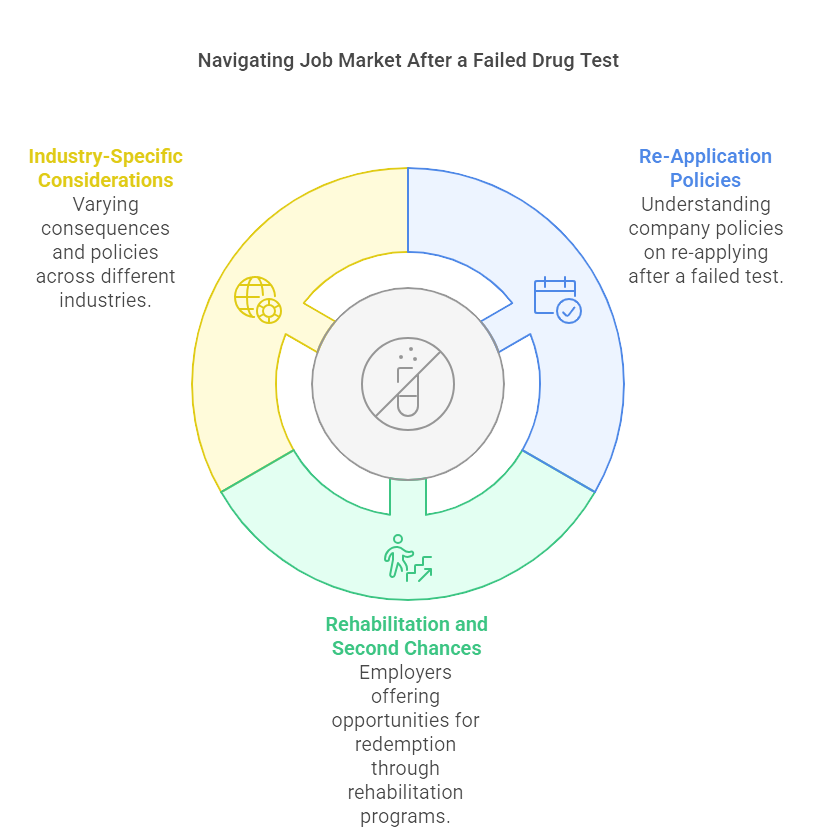
Steps to Take After Failing a Pre-Employment Drug Test
Immediate Actions
If you find yourself faced with a failed pre-employment drug test, it's essential to act quickly. Begin by confirming the test results with your potential employer or the testing agency. Mistakes can happen, and you have the right to request a retest, especially if you suspect a false positive. Collect and review all documentation regarding the test, including the chain of custody and integrity reports, to ensure everything was handled correctly.
Improving Your Prospects
Once you've confirmed the results, take steps to improve your future employability. Enrolling in a rehabilitation program can be a crucial move, both for personal health and future job prospects. Demonstrating a commitment to overcoming substance issues shows potential employers your dedication to self-improvement and reliability. Consider also building up your skills and qualifications in your field, which can help offset the negative impact of a failed drug test on your resume.
Planning for Disclosure
Being transparent about your past can sometimes work in your favor, depending on the circumstances. Prepare for future interviews by crafting a thoughtful and honest explanation of your failed drug test. Frame your narrative around the steps you've taken to address the issue, such as rehabilitation or lifestyle changes, and focus on your readiness to contribute positively to the workplace. Practice this conversation to ensure you convey confidence and responsibility when discussing this sensitive topic.
Taking these steps immediately can help mitigate the impact of a failed pre-employment drug test and set you on a path toward professional recovery and growth.
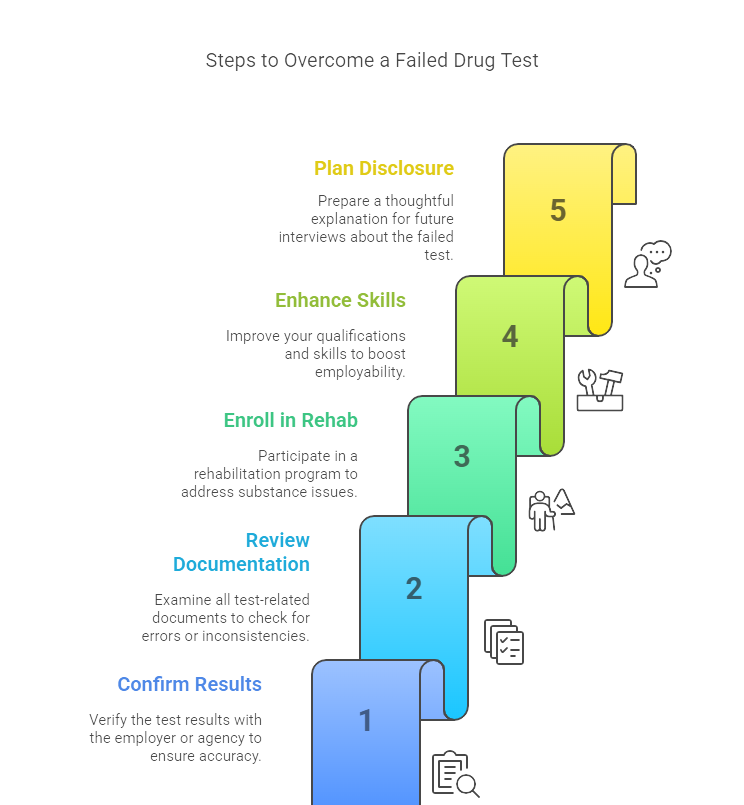
Frequently Asked Questions (FAQ)
What happens if you fail a drug test for a job?
Failing a pre-employment drug test typically results in the immediate withdrawal of the job offer. Different employers have different policies, but most will not proceed with hiring if the candidate does not pass the drug screening.
Does failing a drug test disqualify you from employment?
While failing a drug test usually disqualifies you from the job you applied for, it doesn't necessarily disqualify you from all future employment. Some employers may allow you to reapply after a certain period or after completing a rehabilitation program.
Does a failed pre-employment drug test go on record?
A failed pre-employment drug test does not usually go on your permanent employment record. However, it may be documented internally by the employer that requested the test, impacting future applications within the same company.
Can you still get hired after failing a drug test?
It's possible to get hired elsewhere after failing a drug test, but it largely depends on the industry and the company's policies. Some employers might be more understanding and willing to give a second chance, especially if you can demonstrate steps taken to address the issue.
How long does a failed drug test affect your job search?
The impact of a failed drug test on your job search varies. In some cases, employers might require proof of a clear test before considering you again. The stigma can linger, making it tougher to secure employment, but once remedied and with time, it becomes more manageable.
What can you do to improve your chances after failing a test?
Improving your chances after a failed drug test involves taking proactive steps: verify the accuracy of the result, complete recommended rehabilitation programs, and be honest in future applications about what happened and how you’ve addressed it.
Are there jobs that don’t require pre-employment drug testing?
Yes, some jobs and industries do not require pre-employment drug testing. Startups, certain tech companies, and small businesses might have more lenient policies compared to safety-sensitive fields like healthcare or transportation.
What if the test result was a false positive?
If you believe your drug test result was a false positive, you should immediately request a retest or a validation test, and provide information on any legal substances that could have affected the result. Employers often have appeal processes in place for such situations.
What happens if you fail a drug test for a job interview?
Failing a drug test for a job interview typically results in the withdrawal of the job offer. Some companies may give you a chance to explain a positive result if it was caused by prescribed medication, but generally, a failed drug test is grounds for immediate disqualification from the hiring process.
What happens if your drug test comes back positive?
If your drug test comes back positive, the employer may disqualify you from the job. In some cases, you may be given the opportunity to explain or retake the test if you can provide a legitimate reason, such as a prescription, for the positive result. Follow-up procedures depend on company policy.
What happens if you can't pee for a pre-employment drug test?
If you can't pee for a pre-employment drug test, you may be asked to drink water and wait until you can provide a sample. Some testing facilities also offer alternative testing methods like saliva or hair tests. Failing to provide a urine sample without a valid reason may be considered a refusal, which can result in job offer withdrawal.
What is the most common pre-employment drug test?
The most common pre-employment drug test is the urine test. Urine tests are cost-effective, easy to administer, and can detect a wide range of substances. This method remains the standard approach for most employers to screen potential employees for drug use.
How long does it take to find out if you failed a drug test?
It typically takes 24 to 72 hours to receive the results of a drug test. If the test was sent to a lab, more time might be needed for confirmatory testing if an initial positive result is identified. Employers will generally notify candidates of the results promptly once they are available.
What is the most common false positive drug test?
The most common false positive drug test is usually for THC, the active ingredient in marijuana. Over-the-counter medications like ibuprofen and certain supplements can sometimes cause false positives. Always inform the testing facility of any medications you are taking to minimize the risk of false results.
Conclusion
Failing a pre-employment drug test can feel like a major setback, but it’s not the end of the world. Let’s recap the key points:
First, understand the purpose and types of pre-employment drug tests and know that failing one often leads to a rescinded job offer. However, this failure doesn’t necessarily go on your permanent employment record, and the intricacies of background checks mean the failure might not always show up. Knowledge about your legal rights is crucial, as is the understanding of your options for appealing false positives.
The road ahead might seem tough, but there are concrete steps you can take post-failure. From confirming your results and seeking legal advice, to improving your employability through rehabilitation programs, there are ways to bounce back. It's also important to plan how to address the failed test with potential future employers, showing growth and responsibility.
Remember, one failed test doesn’t define your entire career. Stay informed, understand your rights, and take proactive steps to safeguard your future opportunities. Your career path may take a detour, but it’s still very much navigable.
Additional Resources
- What a County Criminal Background Check Reveals About Your Candidates
- Does a Failed Pre-Employment Drug Test Go on Your Record?
- Understanding Mouth Swab Drug Testing for HR Compliance
- Ensuring Safe Hiring in the Hospitality Industry
- Beyond the Resume: Essential Background Checks for Nannies and Caregivers
- Conducting Screening in the Aviation Industry
- Improving the Screening Process
- Ensuring Safe Hiring in the Construction Industry
- Managing Screening Vendors Effectively
- Ensuring Data Accuracy in Employee Screening
- Enhancing Customer Service in Employee Screening
- Screening Seasonal Workers: Best Practices
- How Security Clearance Impacts Employment Opportunities
- Nebraska Background Check Laws: What HR Departments Need to Know
- Screening Practices for the Legal Sector
- Conducting Screening in the IT Industry
- An Overview of the Employee Screening Industry
- Screening for the Retail Industry
- Screening Practices in the Security Industry
- Understanding Employment Regulation

GCheck Editorial Team
Meet the GCheck Editorial Team, your trusted source for insightful and up-to-date information in the world of employment background checks. Committed to delivering the latest trends, best practices, and industry insights, our team is dedicated to keeping you informed.
With a passion for ensuring accuracy, compliance, and efficiency in background screening, we are your go-to experts in the field. Stay tuned for our comprehensive articles, guides, and analysis, designed to empower businesses and individuals with the knowledge they need to make informed decisions.
At GCheck, we're here to guide you through the complexities of background checks, every step of the way.


